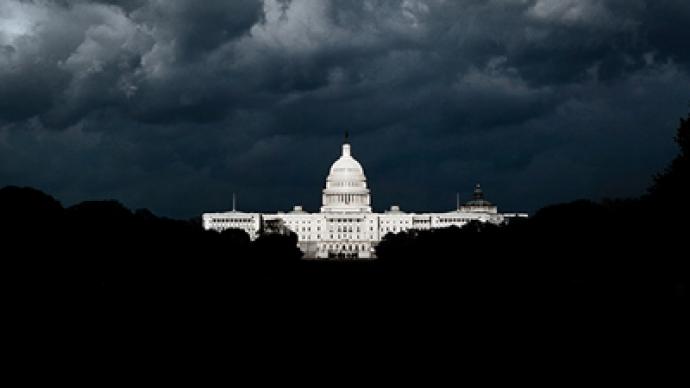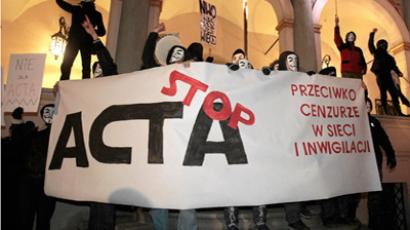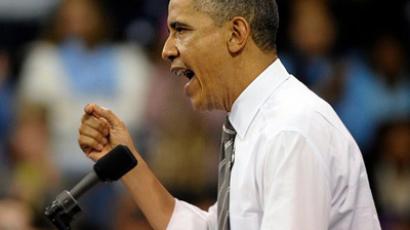CISPA battlefield: Facts & Figures

The House of Representatives has approved CISPA, a controversial bill that will give the government additional levers to monitor the Internet. But what are its chances of being passed into law, and what will it mean for Internet users?
In spite of protest from the Obama administration that CISPA encroaches on the civil liberties of Americans, the House of Representatives is marching ahead with the legislation. It met on Thursday to discuss the controversial act ahead of Friday’s decision.In addition, the House Rules Committee dismissed a list of changes to the legislation suggested by the Center for Democracy and Technology (CDT). The amendments would have potentially limited private companies from sharing cyberthreat data with US government bodies.By disregarding the amendments "the House leadership has squandered an opportunity to achieve balanced cybersecurity legislation," the CDT said in a statement.
What is CISPA?
CISPA, an abbreviation for the Cyber Intelligence Security and Protection Act, was introduced in the House of Representatives on November 30, 2011 by Mike Rogers (R-MI), as well as 111 co-sponsors. Since then, a number of amendments have been introduced. The House is expected to vote on the bill Friday and its author has said that the latest changes brought the number of supporting Congressmen “well past” the threshold of 218 necessary for the adoption of the legislation. It is therefore very likely that the bill will be passed by the House. However, it’s not all that certain whether the bill will be made into law, especially with the White House’s latest statement that President Obama would be advised to veto the legislation.
What does CISPA entail for internet users?
The act says it is meant to create procedures allowing “elements of the intelligence community to share cyber threat intelligence with private-sector entities and to encourage the sharing of such intelligence.” It also states that a cyber-security provider or a self-protected entity may share “cyber threat information” “with any other entity designated by such protected entity, including… the Federal Government.”But what does that mean? Unnecessarily broad definitions are the factor which makes CISPA so controversial with web users. Experts argue that the bill would give the government the ability to circumvent internet privacy laws and obtain information on user activities from private companies – be it providers, hosting companies or social networks – essentially any company involved in the Internet. The bill does specifically say that the Federal Government can only use the information obtained for a “cybersecurity purpose” or the “protection of the national security of the United States,” but the broad definitions of the terms could potentially lump an average Internet user sending an encrypted e-mail into the same threat category as a terrorist. Privately owned corporations could, under the pretext of cyber and national security, spy on users and transfer their data to a government agency.“You will get no accountability for that,” explains David Seaman, host of The DL Show. “If findings are turned against you in the worst possible way, you won’t be able to get a lawyer and sue because of the litigation immunity.”
Where do internet companies stand?
Big Internet companies have largely been supportive of the bill. It has been openly backed by AT&T, Facebook, IBM, Intel, Microsoft, Verizon and others.In all, several major American telecommunication companies and many of the nation’s leading retailers endorse the act.“Whenever you are gathering data, it is a potential business model,” Seaman noted to RT. “You can sell it to the government or privately held security companies and make money over it, so it is a revenue stream.”The support contrasts with the stance of major Internet companies against SOPA and PIPA, which sought to allow the government to prevent access to sites hosting illegally published intellectual property.
Public outrage and action
The legislation has been met with violent opposition among the US public, a “Stop Cyber Spying” petition opposing the bill garnering over 800,000 signatures. A number of famous individuals and corporations have come out against CISPA, saying the bill threatens Internet privacy and even freedom of expression.“[CISPA] is threatening the rights of people in America, and effectively rights everywhere, because what happens in America tends to affect people all over the world,” Tim Bernars-Lee, the man credited with creating the World Wide Web, told The Guardian. US Representative and Presidential candidate Ron Paul (R-TX) called the bill “Big Brother writ large”. The American Civil Liberties Union (ACLU) has also issued a statement criticizing CISPA.“The Cyber Intelligence Sharing and Protection Act would create a cybersecurity exception to all privacy laws and allow companies to share the private and personal data they hold on their American customers with the government for cybersecurity purposes,” the statement reads. The ACLU, along with other NGOs including the Constitution Project and the Center for Democracy and Technology, took part in a so-called “Stop Cyber Spying Week,” during which they sought to raise awareness of CISPA through a Twitter campaign.
SOPA, PIPA and ACTA – three sisters of online privacy violations?
This is not the first time the US Congress has tried to adopt legislation to regulate the Internet. The House of Representatives and Senate also considered adopting the Stop Online Piracy Act (SOPA) and Protect IP Act (PIPA). These bills sought to entitle the US government to curb access to “rogue websites” that illegally uploaded intellectual property. The bills could effectively force search engines to remove these websites from search results, an action many private companies considered intrusive. Many experts also argued the broad provisions of the bills could result in the censorship of millions of Internet users if they simply fell suspect of copyright infringement.PIPA and SOPA were opposed by many Internet giants including Google, Mozilla, Facebook, Yahoo!, Wikipedia and Reddit. Google organized a petition against the legislation, while Wikipedia held a 24-hour blackout to protest the bill in January. As a result of the action, SOPA was recalled while PIPA was postponed indefinitely.But the twin American legislation also has an international sister – the Anti-Counterfeiting Trade Agreement (ACTA), signed by eight countries including the US, Australia and Canada last October. The EU and its member states also joined in January 2012, a move that was met with a wave of protests in Poland, Germany, Austria and a number of other EU nations. Guy Verhofstadt, the leader of the European Parliament’s Alliance of Liberals and Democrats (ALDE), denounced ACTA on Wednesday, saying many of the bill's provisions lacked clarity on how they would be implemented.














